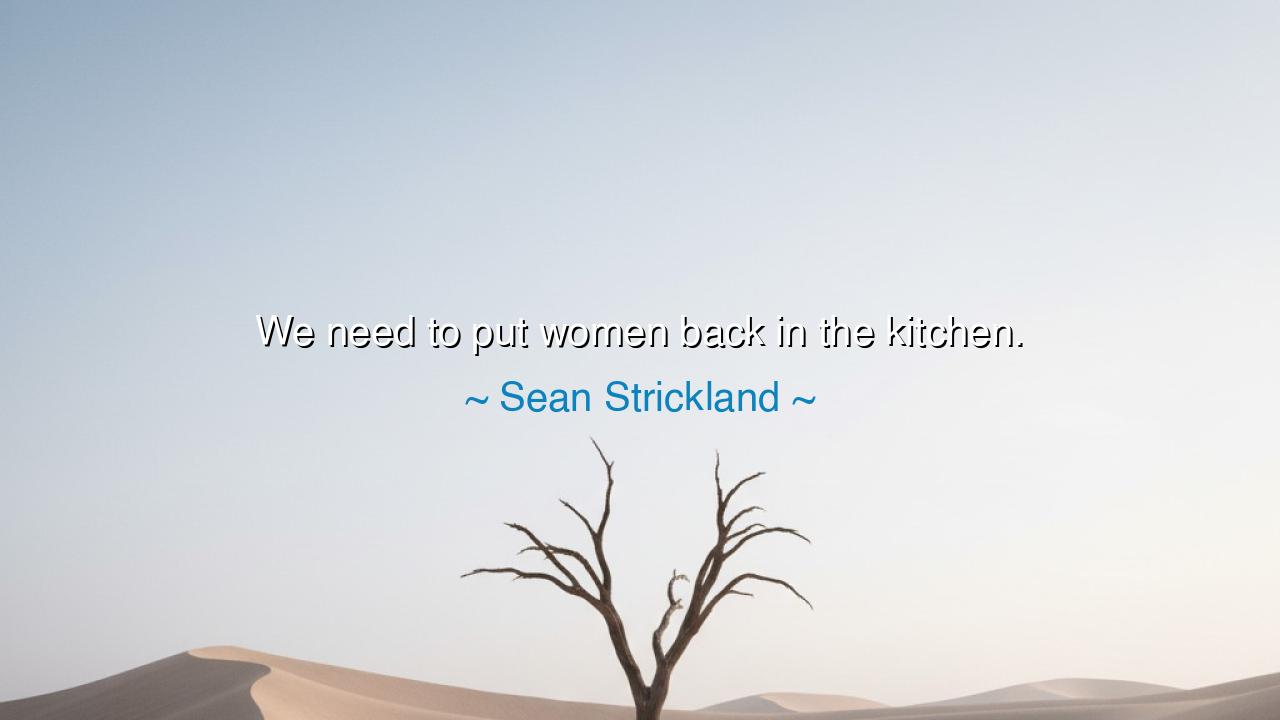
We need to put women back in the kitchen.






When Sean Strickland uttered, “We need to put women back in the kitchen,” his words echoed a sentiment both ancient and dangerous—the attempt to bind women once more to narrow roles defined not by their own will, but by the convenience of men. This phrase, though spoken in jest or bravado, reveals how deeply rooted such beliefs remain, that a woman’s place is in service rather than in freedom. It is a reminder of how long the chains of tradition can endure, even in an age that proclaims equality.
The kitchen, in this context, becomes more than a room; it is the symbol of confinement. For centuries, societies sought to restrict women to the domestic sphere, their worth measured only by their ability to cook, clean, and bear children. While some women chose this path with dignity, the greater injustice lay in stripping them of choice. Strickland’s words, then, are not merely about kitchens, but about power—about the attempt to deny women the full breadth of their humanity.
The ancients themselves provide testimony. In Athens, women were barred from the Assembly and confined to household duties, their voices silenced in the very birthplace of democracy. Yet even then, figures like Aspasia broke through, advising leaders and shaping thought. Likewise, in Rome, Cornelia, mother of the Gracchi, was praised not only as a matron but as a mind of wisdom. These examples remind us that women have always been more than the narrow spaces assigned to them, and any effort to confine them is a betrayal of truth.
History also shows the cost of such confinement. Before the suffrage movements of the nineteenth and twentieth centuries, women were denied education, property rights, and political power—relegated to “kitchens” both literal and symbolic. But when they rose, from the suffragettes in London to Sojourner Truth in America, they proved that society blossoms when women are free to labor not only in homes but in parliaments, universities, and every realm of human endeavor.
Thus, let Strickland’s words be taken not as command but as caution. They remind us of the snares into which humanity so easily falls: the temptation to diminish half of itself. To future generations, let it be said: the kitchen may be a place of creation and love when freely chosen, but it must never again be a prison. For only when women walk unshackled in every sphere of life can a people call itself truly whole.






TNNguyen Thi Tuyet Nhi
Sean Strickland’s comment about putting women back in the kitchen is deeply disappointing and regressive. It’s hard to believe that in a world where women are striving for equality, there are still voices promoting such outdated and sexist views. Does Strickland truly think women belong in the kitchen, or is this just another attempt to provoke controversy? How can we shift the conversation to focus on dismantling these harmful stereotypes and advancing true gender equality?
LLLan Luong
I’m really shocked by Sean Strickland’s comment about putting women back in the kitchen. It’s a throwback to a time when women were expected to be confined to domestic roles, and it completely undermines their achievements in every field. Why does he think such a statement is acceptable in modern society? It makes me question how many others still hold similar outdated views. How do we move beyond these harmful stereotypes and continue making progress toward gender equality?
TTTo Tran Tran
Sean Strickland’s remark about putting women back in the kitchen is deeply frustrating and offensive. It’s an unfortunate reminder of how ingrained gender stereotypes still are, even in 2023. Why is it so hard for some people to understand that women should have the freedom to pursue any career or passion they choose, without being pigeonholed into traditional roles? What can we do to educate others and challenge these regressive viewpoints head-on?
NLNguyen Le
Strickland’s comment about putting women back in the kitchen feels like a slap in the face to all the progress we’ve made in gender equality. It’s disheartening to hear this kind of rhetoric, especially when we know that gender roles should be fluid, not confined to outdated stereotypes. Does Strickland truly believe this, or is he simply trying to provoke a reaction? How do we confront these harmful ideas and continue pushing for a more inclusive and equal society?
GDGold D.dragon
I find Sean Strickland’s statement about women belonging in the kitchen incredibly disappointing. This kind of thinking feels like a huge step backward in the ongoing struggle for gender equality. Why are we still hearing these outdated and limiting views? Women have proven themselves capable in all fields, and this type of comment disregards the hard work they’ve put in to break free from societal constraints. What can we do to challenge these harmful attitudes more effectively?